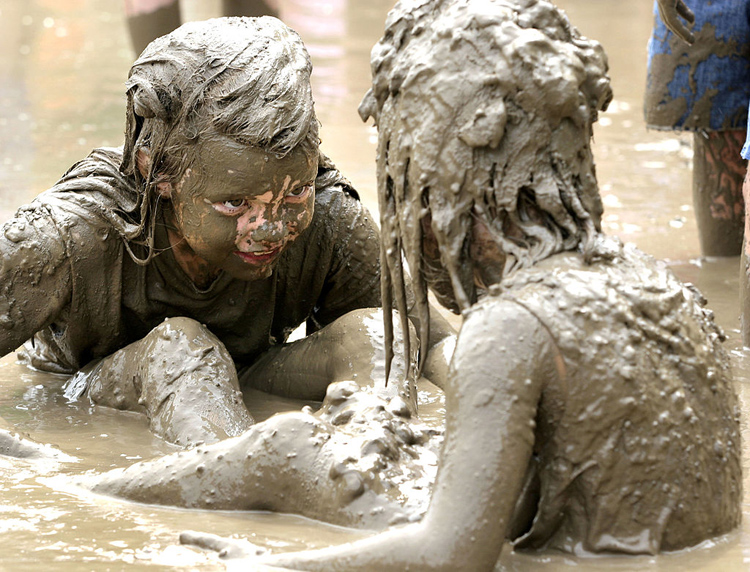Your kids don’t need to wash their hands all that often. Before dinner is fine.

Soap and water will do — but not antimicrobial soap. Throw it away.
Save the hand sanitizer for times when someone in the house is sick.
If your kids are a bit grubby, don’t worry about it too much. Don’t sterilize baby bottles — washing them normally is fine.
Oh, and get a dog — a friendly, slobbery one is ideal. Extra points if it tracks mud into the house.
And if your baby drops its soother on the floor, suck it clean in your own mouth and give it back to them.
It goes against conventional wisdom, which basically holds that the cleaner our environments are, the better — especially for children.
But Brett Finlay, a microbiologist at the University of British Columbia, argues that while the emphasis on hygiene over the last century has saved lives in the past, it has now gone too far. Children’s immune systems aren’t exposed to a wide enough variety of microbes, and the result is rising rates of asthma and allergies.
WATCH: Kids have long been urged to wash their hands – but now a pair of UBC microbiologists say let kids get dirty. Their research says bacteria plays a vital role in growing bodies. Rumina Daya has more.

Also, their gut flora, now thought to play an important but little-understood role in our health, won’t be as complex, he says.
“For the last hundred years, both kids and adults have died of infectious diseases,” Finlay says. “If you look at what was killing people 50 years ago, 100 years ago, it was mainly infectious diseases. So as a society we went on a major hygiene campaign.”
Our relationship with microbes is complex, but the basics are simple, Finlay explains: the more your immune system knows, the better the job it does. The more it’s exposed to, the more it knows. And the earlier in life this all happens, the better.
“It’s really important that you get a good microbial exposure early in life,” he says. “In the last five years or so there have just been stunning discoveries that these microbes play a key role in how our bodies develop. They shape how our immune system develops.”
“We now realize that we need these things to evolve normally.”
The solution, fortunately, is really simple. Don’t worry about children’s environments being perfectly clean.
Finlay’s book, Let Them Eat Dirt, co-written with University of Calgary scientist Marie-Claire Arietta, was published last week.
(Arietta published a paper last year connecting asthma in babies to their lacking certain intestinal bacteria.)
WATCH: UBC scientist Marie-Claire Arrieta talks about the research behind why you should let your kids play in the dirt from an early age

Finlay’s argument dovetails with recent studies showing, for example, that children raised in traditional agricultural societies, like the Amish, have lower rates of asthma, or that children with an early exposure to peanut butter are less likely to develop a peanut allergy.
READ MORE: Why many medical experts think food bans in schools go too far
“We have to ease off a bit on the hygiene,” Finlay says. “If kids are vaccinated, the chance of them picking up a standard infectious disease is much less than it used to be.”
“Most microbes are actually our friends, and won’t do any harm.”
“It’s only a small subset that are infectious diseases that you have to fear. But for the most part we have clean water, we have clean food, we just don’t see the diseases that one sees in very poor areas in Africa or something.”
Finlay’s argument, often referred to as the “hygiene hypothesis,” was first proposed in 1989. Like any theory, it has sparked agreement and disagreement since then.
In an interview with Global News, McMaster University allergist Susan Waserman connected the rise in allergies in Western countries to “living too cleanly.”
“Our immune systems have gotten lazy because they no longer have to fight infection as much,” she said.
The connection to asthma has been more debated.
A 2010 paper pointed out that the hygiene hypothesis couldn’t account for higher rates of asthma in U.S. inner cities, which the authors assumed had less hygenic conditions than areas with lower rates. (On the other hand, the authors also said that children of Turkish migrants living in low-income urban neighbourhoods in Europe had lower-than-average asthma rates. It’s not clear why.)
In 2004, a study from Stanford University argued that asthma was much more connected to having been infected with influenza A than anything to do with hygiene.
How much dirt is safe to eat may depend on your neighbourhood’s history. Sometimes, long-gone industry left lead in the soil, as was the case in the South Riverdale neighbourhood in east-end Toronto.
In Rochester, N.Y., a study looking at why African-American children had higher lead levels than white children found part of the answer in soil contamination in low-income neighbourhoods. Children would either eat dirt directly, or consume it indirectly while handling dirty objects while playing outside.
Lead in paint and water were also important factors.
- Roll Up To Win? Tim Hortons says $55K boat win email was ‘human error’
- Bird flu risk to humans an ‘enormous concern,’ WHO says. Here’s what to know
- Halifax homeless encampment hits double capacity, officials mull next step
- Ontario premier calls cost of gas ‘absolutely disgusting,’ raises price-gouging concerns




Comments